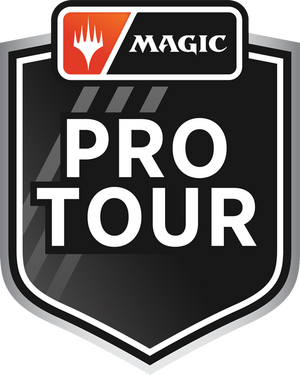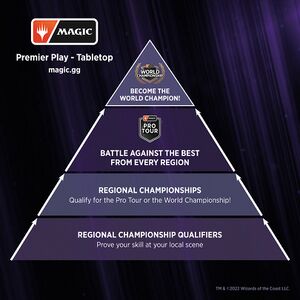Pro Tour

The Pro Tour, abbreviated PT, is a series of major invitation-only DCI-sanctioned Magic: The Gathering tournaments, held about once every three months from 1996 to 2018.[1][2][3] The Pro Tour was reinstated for the 2022–23 Pro Tour Season.[4]
History
Even early on in Magic history, there had been high-prestige tournaments that had attracted a lot of top players, most notably the 1994 World Championships, the first major tournament, which ran over three days of competition. However, the winner, Zak Dolan, received a trophy and a large number of booster packs from various sets, but no money.[5] Similarly, the 1995 World Championship winner, Alexander Blumke, won a box of Legends and some miscellaneous packs.[2] In 1995, Magic Brand Manager Skaff Elias felt that Organized Play needed to step up to the next level. Players had to have something to aspire to. Thus was the Pro Tour created.[6][7]
As envisioned by Skaff Elias, the first Pro Tour - very briefly called the Black Lotus Pro Tour - was held on 16–18 February 1996 in New York City.[8][9] Also known as "Pro Tour Speed Dial" and "The Showdown in New York",[10] Michael Loconto from the United States ended up the winner, taking down 1994 Worlds finalist Bertrand Lestrée in the final. Loconto pocketed $12,000 for the win, much more than the winners of the early major tournaments got, yet a lot less than future Pro Tour winners would earn. The event was not streamed live, but a video was later published by Wizards.[6] In addition to the main event, there was also a junior Pro Tour for players under eighteen. The junior Pro Tour continued for a couple of years, until it was transformed into the Junior Super Series. The first Pro Tour season included three more Pro Tour events, culminating in the final Pro Tour, the World Championships, held at Wizards of the Coast's corporate offices in Seattle.
Since 1996, Pro Tours have been held every year, with the number of events varying from three to seven per year. Pro Tour Shadows over Innistrad in Madrid in April 2016 was the 100th Pro Tour event.
The prize purse of the Pro Tours increased rapidly, from $30,000 at the first Pro Tour to $100,000 at the second, Pro Tour Los Angeles 1996, to $200,000 at the 1997 World Championships (plus $50,000 for the team competition). However, since then, the prizes increased slowly; as of 2016, Pro Tours awarded $250,000 in prizes.
In 2019, more than twenty years after the first, the Pro Tours were rebranded as Mythic Championships.[11] In 2020, this was changed again, to Players Tour.[12] At the same time, Wizards of the Coast introduced the short-lived Magic Esports competition with the Magic Pro League (or "MPL") and the Rivals League. MPL players would be invited to Mythic Invitationals and all Tabletop Players Tour events.
At the end of the 2022 season, the MPL and the Rivals League were terminated[13] and a modified old system was reinstated.[4] This Premier Play program once again featured Pro Tours.
Qualification

Pro Tours are invitation-only events. There are several ways to qualify.[14] The most common ways will be:
- Be one of the top finishers at the previous Regional Championship, with invites passing down as players earn multiple qualifications.
- Finish with ten or more wins at the previous Pro Tour.
- Magic: The Gathering Online Champions Showcases
- Players who finish with 39 or more Adjusted Match Points from the previous three Pro Tours (rolling).
For the transitional period between the sunsetting of the League structure and the first new Pro Tour in 2023, more invites will be given out for those beyond the normal cutoff point at the Regional Championships.
Members of the Magic: The Gathering Hall of Fame are invited to one Regional Championship and Pro Tour per season. Those events must be in the same round and cannot be in the same round in which they played in a Regional Championship Qualifier.
Structure
Pro Tours are hosted by Wizards of the Coast. Currently, they are 16-round Swiss-paired events that are split into two mornings of three-round Draft pods and two afternoons of five-round Constructed. As of 2023, each year has one Pro Tour of each supported Constructed format in Standard, Pioneer and Modern; the Modern one often receives a new product in the summer supplementary period. Players strive for first a four-win record to qualify for Day 2, ten wins to requalify for the next Pro Tour, then twelve wins to qualify for the Top 8. At twelve wins, the player is removed from the pool and given winner's byes; this to avoid excessive intentional draws and is one of the holdovers from the online-only Players Tour era.
The Top 8 is a set of knockout rounds with best-of-five matches, as opposed to the traditional best-of-three. Sideboarding begins after the second game.
Pro Tour season
The Pro Tour Season usually consists of three to four Pro Tour events spread through the calendar year.
Prior to the 2005 season, the season ran roughly from August to the following August, culminating with Worlds in August or early September. The 2005 season was extended, with it beginning after the 2004 World Championships in September 2004, and ending with the 2005 World Championships in December 2005. From 2005 to 2012, the seasons were run as a unit of year (half year in 2012), which consisted of three to five Pro Tour events spread throughout the calendar year.
Starting with the 2012 season, all Pro Tour rounds were named after the most recent expansion instead of the location of the venue, and were held two weeks after the release of that expansion. The season hence started with rotation in September and ends in July to August. Starting with Pro Tour Ixalan, the interval between the expansion and the Pro Tour were no longer fixed, and as of Mythic Championship Cleveland 2019, Pro Tours were no longer tied to sets. This was reversed in 2020 due to needing remote digital play.
For Premier Play, the expansion release date and Pro Tour schedule were generally decoupled. There are three Pro Tours each year, with the first Pro Tour in February, which is after the third expansion of the rotation season is released. The third Pro Tour is after the supplementary summer set, while Worlds is immediately after rotation.
Trivia
- The player who has played the most Pro Tours is Raphaël Lévy. As of Mythic Championship Cleveland 2019, Levy had attended 100 Pro Tours.
- Levy is also the player who has attended the most consecutive Pro Tours, with 91 starting with the 1998 World Championships and ending with Pro Tour Hour of Devastation in 2017.
- The player with the current longest active streak of Pro Tours attended is Shuhei Nakamura, who, as of PT Guilds of Ravnica, has attended 60 in a row since the 2004 World Championships. Whether this streak broke depends on how one defines the Mythic Championships and regional Players Tour events. His streak continues for those named Pro Tour, having attended all three in 2023.
- The largest Pro Tour of all time was PT Charleston 2006, with 525 players (175 teams).
- The largest individual Pro Tour was PT Guilds of Ravnica, with 510 players.
- The only player who has won two consecutive Pro Tour events was Kai Budde, who in 2001 followed up his win at PT New York with a win at PT New Orleans. No player has won back-to-back individual Pro Tours (at PT New York, a Team Limited event, Budde won alongside teammates Dirk Baberowski and Marco Blume).
- Nicolai Herzog won back-to-back Limited-format Pro Tours in 2004, winning in Amsterdam and San Diego. However, Pro Tour Kobe, a Block Constructed event, happened between those Pro Tours.
- Three players have finished in the top eight of three consecutive Pro Tour events: Scott Johns (Los Angeles 1996, Columbus 1996, Worlds 1996), Jon Finkel (New York 1998, Worlds 1998, Chicago 1998), and Luis Scott-Vargas (Oath of the Gatewatch, Shadows over Innistrad, Eldritch Moon).
- The player with the most money finishes in consecutive Pro Tour events is Jon Finkel, who cashed every Pro Tour from PT New York 1997 to PT Los Angeles 1999, ten in total.
See also
Promos
References
- ↑ Mark Rosewater (August 09, 2004). "On Tour, Part 2". magicthegathering.com. Wizards of the Coast.
- ↑ a b Mark Justice (June 01, 2009). "Musings on the History of the Magic Pro Tour". magicthegathering.com. Wizards of the Coast.
- ↑ Blake Rasmussen (November 24, 2014). "Magic's First Pro Tour Top 8". magicthegathering.com. Wizards of the Coast.
- ↑ a b Wizards of the Coast (March 31, 2022). "Return of the Pro Tour, Your Path to Playing Magic at the Highest Level". Magic.gg.
- ↑ Zak Dolan (2004-08-26). "ZAK DOLAN'S WORLDS DIARY". Wizards of the Coast. Retrieved on 2015-09-25.
- ↑ a b Mark Rosewater (July 26, 2004). "On Tour, Part 1". magicthegathering.com. Wizards of the Coast.
- ↑ Brian David-Marshall (February 2, 2016). "An Oral History of the First Pro Tour". magicthegathering.com. Wizards of the Coast.
- ↑ Mark Rosewater and Henry Stern (August 21, 2006). "Inside "Showdown in New York"". magicthegathering.com. Wizards of the Coast.
- ↑ Mark Rosewater (December 12, 2011). "Flashback to the Future". magicthegathering.com. Wizards of the Coast.
- ↑ Magic the Gathering Showdown in New York 1/10. YouTube. Retrieved on 2015-09-29.
- ↑ Elaine Chase (December 6, 2018). "The Next Chapter for Magic: Esports". magicthegathering.com. Wizards of the Coast.
- ↑ Elaine Chase (August 14, 2019). "The Future of Magic Esports". Magic Esports.
- ↑ The new ORGANIZED PLAY announcement and how it affects competitive players (Video). Paulo Vitor Damo da Rosa. YouTube (May 14, 2021).
- ↑ Wizards of the Coast (March 31, 2022). "Return of the Pro Tour: Details". Magic.gg.